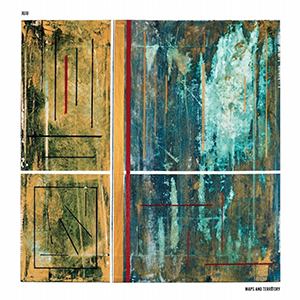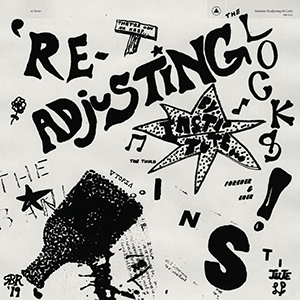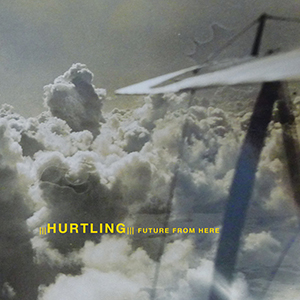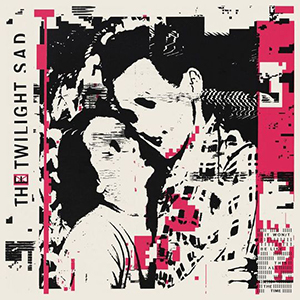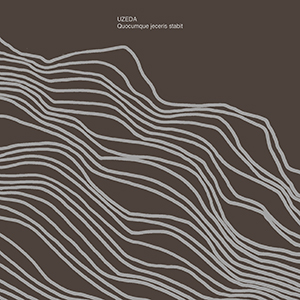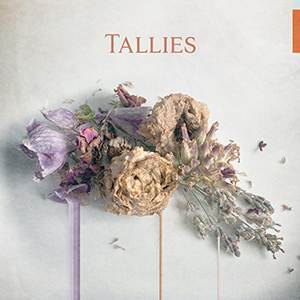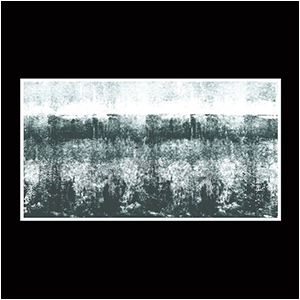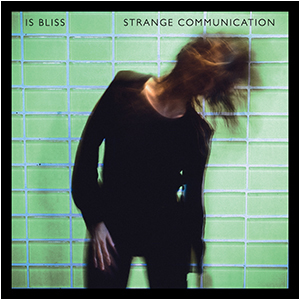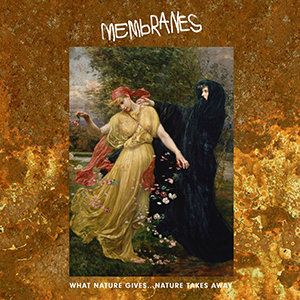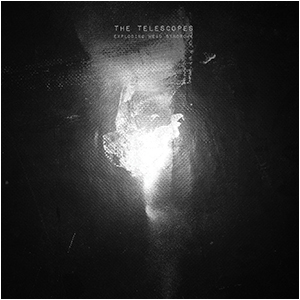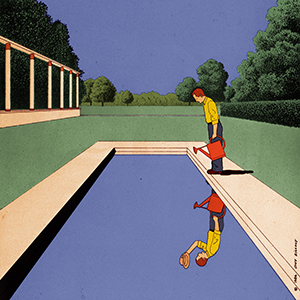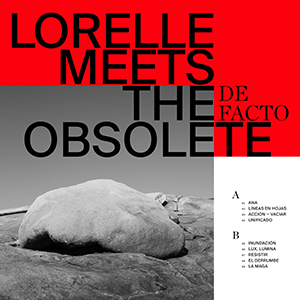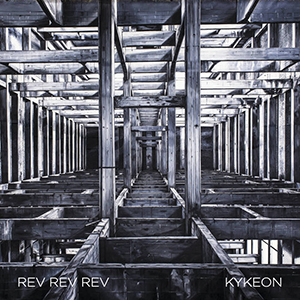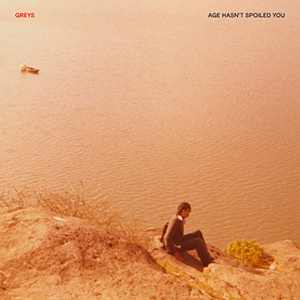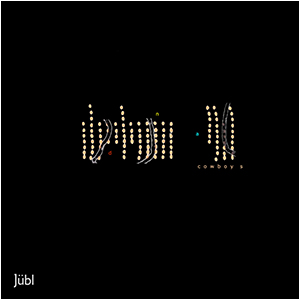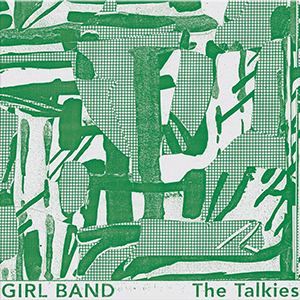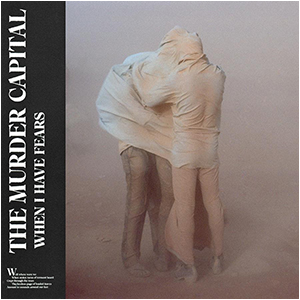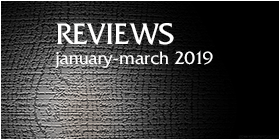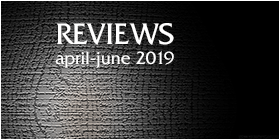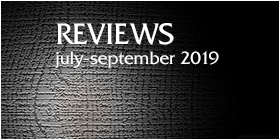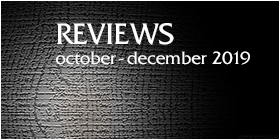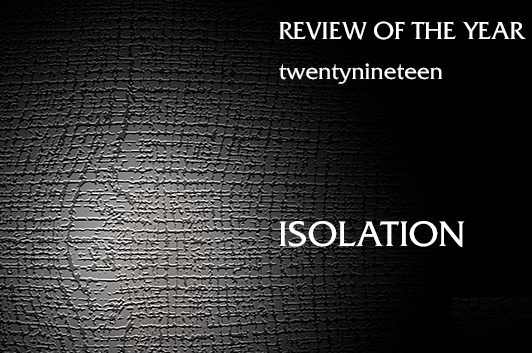
The Community Of Hope
The renaissance in alternative music has been a beautiful thing. We never reckoned on it lasting this long, but it appears to have taken root and we give thanks for it on a daily basis. There is no doubt we have enjoyed the most sustained era of innovation, experimentation, passion and energy in music since the 1990s, that dramatic decade in which our scene – our entire sub-culture which had been immovable since the first post-punk pioneers took that giant leap in 1978 – wilted from flourishing to non-existent in just a handful of years. As the new millennium turned it was lost and it was bloody scary. It seemed like every marker by which we identified ourselves was no longer valid. Our community disappeared. We felt we were the last of our kind; the world had been wiped clean and we were groping in the darkness for anything to hold on to. It was frightening because we hadn’t changed, because music was at the centre of everything we believed in: it was how we dressed, our friends, our outlook on life, our moral high ground...
In desperation some looked to the new world for an answer, but fool’s gold wasn’t enough to sustain us. It needed something monumental, a searing light in the darkness and it came just in time. We seriously believe The Libertines saved our lives. Their stumbling, drunken poetry was like a heavenly choir and their dysfunctionality a treasured, childhood memory. Such beauty pouring from such chaos. Many understood and would have bled for them. Bill Bones knew. They gave renewed life to a brittle corpse and it bought us time. It gave us time to get a grip, to take up arms, to try and relight fires, to insist that the truth was out there and we would never be lost again. We would never surrender. And we didn’t.
So, as we enjoy this current paradise on earth, perhaps we should be asking ourselves how our tribe of a million alienated individuals came to be broken apart so brutally. How the sub-culture that had 600,000 music papers printed just for it EVERY WEEK ended up with nothing at all. And, most importantly, how the hell do we stop the same thing from happening again?
Is it coincidence that the collapse of the alternative music culture coincided with the rise of the internet? Internet services were first offered in the UK in 1992, with the first broadband arriving in 2000. Did the internet make everybody stupid? Did it deprive anybody of the ability to read? On the contrary, the internet may have made selling print more difficult, but readerships increased. The NME website became the biggest in the world as the magazine’s print sales fell to pathetically low numbers. But did it carry us along with it? The alternative community was notoriously slow at adapting to change. The survival of vinyl owes a lot to this awkward generation who kept buying it when everybody else had moved on to CDs. It may well have stayed stoically analogue had the opportunity been there. But the vinyl records began to disappear as record companies delighted in the huge profit margins of CDs, and the music papers saw pound signs and got lazy.
When the music media finally came to accept punk, and then acknowledge post-punk (which in many ways appeared to be a harder journey for them), the quality of journalism improved beyond measure. You saw the same spirit of adventure from those writing about music to those who ran the indie labels that sprang up in glorious numbers. These were true believers in a new way who recognised that the chasm that opened up between the mainstream and underground around 1980 brought with it unparalleled freedom and a world of opportunity. Scores of labels, backed by three serious music papers, did exactly what they liked. It was an exciting place to be. It was a world in which great bands with relatively small followings could make a decent living because they would always have a share of the market on their side. How many records would The Wolfgang Press have made in a pre-punk world? Or Throwing Muses?
Well into the nineties the quality of the journalism was top class. The NME ruled the roost up to the mid 1980s when the Melody Maker began to scale unreached heights. Occasionally, things got a little over-pretentious, but even that was a price worth paying for the genuine insight on offer and a power of description that could enhance your understanding of what was on offer. Often these journalists were discussing tangental, kaleidoscopes of sound, not simple 12-bar blues collections in all their monochrome tedium. These works were begging to be framed, in poetry if possible, and some of these journalists were magnificent. Words have the power to build or destroy, to thrill or deflate. That expression “writing about music is like dancing about architecture” is the ultimate surrender. Yes, people like different things, but is art genuinely subjective? Does that mean nobody should bother to discuss art? Does it mean that because somebody likes something it is inherently good? Or valuable? More people like Barabara Cartland than Shakespeare. More people bought records by Jimmy Osmond than Leonard Cohen. I mean, is this a serious argument? Quality can always be discovered, uncovered and lauded.
Strangely, it may have been the mainstream that first affected the underground press. The fourth music paper, Record Mirror, was a healthily disrespectful, chart-orientated paper. It lost out as interest in the charts waned from the alternative crowd who were genuinely obsessed with music, whereas those with a more superficial interest were not looking for in-depth journalism. This led to the rise of the comic book papers, such as Smash Hits, which was really an old style songword publication in the style of Mickie and Disco 45 which had tapped into the teen market in the 1970s. In 1982 Record Mirror attempted to turn itself into a similar glossy, comic-style magazine, focussing increasingly on pop music and including humorous features and lists. It dumbed down. It was hit again when the glossy monthlies started arriving in 1986 and took dumbing down to a new level. Record reviews shrank to a couple of inches and everything was marked out of ten, or given stars. What is the point of a hundred words when you can just write down a number? These were magazines largely aimed at older audiences, who still loved rock music and didn’t want too much detail on other genres to have to ingest. The wilting Record Mirror closed in 1991 when United Newspapers decided to rid themselves of all of their consumer magazines, on whatever subject. This departure also had an affect on the underground scene with the magazine’s sister paper Sounds being euthanized at the same time, not because of viability but because of economic convenience.
By the start of the 1990s Smash Hits was selling over a million copies per issue and the publishers of the remaining underground weeklies were hoping this was a market they might be able to tap into. The whole page album reviews in the NME and MM began to shrink, marks started to be awarded, lists began to appear and pages that previously would have carried well thought-out, in-depth interviews were replaced by enormous pictures over a two-page spread graced with about 100 words. Why pay quality journalists to write about music when you can print big pictures and get any junior to draw up a list? We were soon blessed with the best 50 this, the worst 100 that, albums of the decade, albums of the century, albums of 24th June. Lazy shit. Meaningless shit. And rampant quantification. Writing about music can be a wonderful thing if done with skill and passion. Yet whatever superlatives a reviewer may want to apply to a record, they can only imbue their belief into their words, they cannot quantify the music on offer. A good review will encourage people to listen to see if they share the empathy that thrilled the writer. It will entice you in and tease you. The new way was different. “Here’s a record. It’s quite good. Seven out of ten.” What the fuck does that mean? How many records in the whole history of popular music deserve to be awarded ten out of ten? How many are entirely perfect? Probably none, though a couple must come bloody close. In the new spirit of laziness countless records ended up with nines or tens. In the glossy monthlies now there are probably three hundred albums a year that get awarded eight or above. Surely everybody must need to own a record that could score that high. It’s all bollocks. A system designed to appease the advertisers who release these records and fund their lifestyles.
Some of these glossies survive and we reprint a list from one in this review for balance. These publications are bottom-feeding parasites that live in thrall to their advertisers, chucking away free CDs to help promote the latest shite their sponsors wish to unload. We would ignore them if they had not been so damaging, and if they did not harp on about 'New Music' yet feature on their front cover this year Joni Mitchell, Keith Richards, Fleetwood Mac, Bob Dylan, Queen, Bruce Springsteen, Tom Waits, The Beatles, The Who and Neil Young. There are not many there who didn't have a few records out before we were even fucking born. Of course there is a place for historical music articles; it's just not our place, so stop pretending you have any clue as to what we need to hear. Slapping Fontaines DC into your album of the year list is a pointless exercise if you truly believe that only two people made a better and more important record this year than Bruce Springsteen.
Dumbing down was the worst mistake the music media could make. The alternative sub-culture lived by unspoken rules that made the mainstream something that could not be tolerated. If the press turned its focus away from quality and marginalism, then the press was abandoned. Circulations plummeted. From a peak of over 300,000 the NME’s circulation was down to 75,000 by 2004 and by 2014 it was 15,000. Ironically at that time the alternative renaissance was in its infancy and the magazine could have embraced this. It didn’t. MM’s circulation dropped from a peak of 250,000 to a low of 33,000 in 2000 when it was merged into the NME. The NME turned into a free advertising sheet in 2015 and closed its print edition in 2018. It was all so sad.
With its champions already beginning to struggle, the final nail in the coffin for the alternative world was Britpop, almost a masterclass in dumbing down. Yes, of course there were great bands that got inextricably tied to that label, but there was an explosion of laddish rock bands who appeared the very antithesis of everything the alternative scene stood for. And they swept all before them. Britpop killed the underground by dragging it back into the mainstream. The debates were not whether an indie band would make it on to Top Of The Pops, an almost subversive act in the 1980s, but which one would get to number one that week. Everything became measured by chart success, by sales, by publicity, by money. It was all wrong. And like everything else in the mainstream, it was a fad, a brief moment in time. Interest moved on and with no grounding in alternative culture, the youngsters who had recently got into music moved away with it. The alternative scene was shattered and though some fine bands rose up who were completely opposed to the brash consumerism of Britpop, their natural and pleasing introversion meant they were ill-equipped to fight a near-impossible rearguard action. Indie labels crumbled along with the indie press.
So, it was complacency that really killed the underground: not being firm enough to stand up for our values. It was the fear of calling things out as worthless shit when it was clear they were, even though some bands may have dressed in the right clothes and pretended to be from among us. It was allowing consumerism to triumph after twenty years of avoiding it. Losing the fear of the spotlight. Or the daylight. OK, we live in a different world now and similar events may not have similar consequences, so what exactly can we learn from past mistakes?
At the heart of everything we believe in is community. It was something that was hard won in the early years of post-punk. It was something we took for granted through the 1980s and 1990s. It was something that disappeared in the 2000s. If it can be rebuilt in the 2020s then there is a chance the music we all love will endure. Yes, there are far more young faces at alternative gigs than there were ten years ago. It’s great to see, but these youngsters need to be able to learn about the music from the past and how it shapes the present. How a rejection of the mainstream is not only possible but vital. How the underground can be self-sustaining. The whole foundation of renaissance is that it captures strands from the past and weaves them in something relevant for the present. Something precious. Let’s not knock young bands who sound a lot like bands we knew twenty or thirty years ago. Given time they will develop their own sound, and let’s simply enjoy the fact they have great taste and are looking to learn from the best. Take Ist Ist in Manchester who were constantly criticised for sounding like Joy Division. Yes, their influences were worn on their sleeves but over the past few years they have evolved into something unique and portentous. Their playing is ever-developing, their lyrics are great and they are filling bigger and bigger venues. The excitement at their gigs is the same we felt when we were witnessing something extraordinary. Joy Division were important, but they have gone. It’s vital to build on the foundations they laid.
It is not young bands searching for gold that we need to worry about. It is the Butlin's bands, the nostalgia acts, those who are resurrecting themselves to make a few bob, but are not offering any challenging new music. Don't let them steal your focus from those who really deserve your support. Search out these new bands, encourage them; treasure never falls on your head, you have to dig to find it.
Supporting these bands by attending gigs is certainly one way of rebuilding community. Could that not be used in combination with our one-time enemy, the internet? We don’t doubt that we learned slowly, far slower than the younger generations in thrall to dance and hip-hop. They quickly embraced the internet as a new opportunity, and the alternative scene was slow to catch up. But we got there in the end. We don’t have the huge music press we once did, but we have numerous bloggers. We have few independent labels, but we have independent bands who these days are able to operate on their own terms. We don’t have any great national alternative radio, but we have podcasts and occasional shows on independent stations. The trouble is the alternative scene values its individuality so much it struggles to interact. We have said it before. The need to form ties is overriding, the need to support and not just lose ourselves in our own little projects is vital. Why not help each other, borrow from each other and work towards building something bigger and stronger? When these young bands are playing gigs, let’s get the reviews everywhere and help spread the word.
We applaud Louder Than War which is the only print publication remaining that focuses solely on alternative music. The magazine complements the website of the same name which is pretty much essential for lovers of indie music. Despite its existence solely within the alternative sphere where you would assume they would embrace the alternative spirit, there are still elements there that make us scream. Perhaps too much aimed at the clickbait generation they overuse lists, they throw out too many superlatives, and they fronted their review of the year this time around with the headline: “The Only Top 50 Albums of the Year List That Matters!” WTF? No. Seriously. Are we living in an age where we are fighting to keep our culture alive or are we only concerned with belittling each other to gain another notch in the likes column? What is even stranger is that there are separate lists for LTW magazine and the LTW website, so they are even fighting each other! There are not enough of us to be carrying on like cut-throat tabloids. We should be encouraging each other, sharing and supporting. Why doesn't LTW print a feature of lists from various alternative blogs to show solidarity and respect? To show that everyone who is involved in this battle is valuable? That we have common cause? We have printed their albums of the year list every year; it's a valid one. It's certainly more valid than lists from record shops and highly sponsored mainstream media publications because the people involved in the LTW projects are there working at the grass roots, giving alternative bands the much-needed oxygen of publicity and (hopefully) measured praise. So, why the ridiculous attitude? We are sure this is just carelessness rather than capitalism, but we really can't afford too many mistakes, especially from those in more prominent positions. Let's look forward to the fostering of a new sense of togetherness. We know who our enemies are ... and it is not each other. If the kids are united. Really.
While on the subject of lists, we also feature a couple from important independent record shops. These are worth a glance. Of course, these often feature artists whose records are still clogging up the shelves, but the salespeople in such stores tend to be genuine music lovers and record buyers, so there is some degree of balance. It's always worth looking beyond the top twenty of these if you can to find out what is really affecting people.
When you consider working together to rebuild our community, there are few better at this than Steve Williamson and his Everything Indie Over 40 site. Originally billed as a nostalgia site, the current push to explore and embrace new music is such an important step. Yes, we love the music we grew up with. We’ll talk about it to anybody until the cows come home, have calves, and they have left home. But new music is the lifeblood of our culture. We need to foster an environment which will inspire people to form new bands. Among those who connect with Steve’s site there are many who write about music, talk about music on the radio or podcasts, encourage the listening of music, or who make music themselves. Take the time to check out what they are doing. Help them to prosper and develop. Try it yourself. We hearitly applaud Steve’s enthusiasm, inventiveness and overriding aim of always moving forward.
While you are exploring all of the fabulous new music that is being recommended by these numerous bloggers, we would urge everyone to continue to buy vinyl from independent retailers. This is one thing that makes buying music an event. It gives you something to treasure in the way that a CD never quite managed. It gives you discernable artwork, it makes putting music on something more than a click of a button and affects you in all kinds of hidden ways. It is great to see sales of turntables booming, especially amongst the younger population. Hopefully they will fill their lives with vinyl. This is likely to continue in the short term for the music industry remains healthy. The International Federation of the Phonographic Industry reported that the global recorded music market grew 9.7% from 2018 to a huge £14.6 billion. The UK showed a 3.1% increase in revenues raised from streaming, downloads and physical recordings. This growth, which has been steady over the past few years, saw the UK (population 66 million) overtake Germany (83 million) to become the third largest market in the world behind the USA (327 million) and Japan (120 million). Indeed, the UK music industry is the fastest growing in all of Europe and British fans bought or streamed the equivalent of 154 million albums last year, consumption hitting its highest level since 2006. Sales of vinyl continued to expand, though the growth in sales slowed to around 4.1%. This meant that 4.3 million vinyl albums were sold in the UK in 2019, one in every eight physical or digital albums now being purchased in that format. Liam Gallagher's Why Me? Why Not? was at the top of the vinyl charts in 2019, with 29,000 copies sold. CDs still sell in larger numbers in the UK, though the gap is now much narrower in the States and at one stage it looked as though vinyl would come out on top there. 23.5 million CDs were sold in the UK, a fall of 26.5% on the year, less than half the number sold just three years ago. In some ways this has come about because many smaller labels are abandoning the format in favour of vinyl, and there are just not the options there were even a couple of years ago. CDs remain a viable and cheap option for physical product and it will be interesting to see what happens if the demand for vinyl ever begins to wobble.
Virtually all of the best-selling vinyl seven-inch singles were reissued old product. The single is not a format that is prospering, with the CD single and the individual download now only barely warm in their graves. The attractive policy of labels giving away CD copies with vinyl albums has also disappeared. Europe's Tapete Records had been continuing this trend, but now even they appear to have abandoned ship to the surprise even of their artists, leaving The Telescopes' Exploding Head Syndrome LP without any of its pre-advertised digital accompaniments. This is such a shame as another door closes on the record-buying public who are beginning to be treated as cash cows once again.
So, on to our albums of the year, the only list we ever compile and that grudgingly. From 2019 we have picked nine debut albums in our top twenty which is the best number for many years. A lot of the others included may be second or third albums which is also a great sign. Of the old guard only The Telescopes, much respected prolific contributors, and The Membranes, not so prolific but vaultingly ambitious, sneak into the list. It has been a quiet year for established or reformed bands and this has left room for younger artists to blossom. Things feel fresh and exciting and we believe it is the strongest list of albums released since 2016 or possibly even 2013, the two best years of the now-departed 2010s. If you don’t know these records then give them a listen; we are confident there is much there to be treasured. Next year write your own list and send it to us. Tell us what we are missing or what we have under-estimated. Write reviews, start a blog, start a fan club, start a record shop. Get involved and help us build.
Thanks to Gary and Sue for their input. Thanks to Steve Williamson and Rob Morgan for their contributions to this bewilderingly long ramble. We will ask for more contributions in future....
Albums of the Year
Mojo
1. Nick Cave & The Bad Seeds - Ghosteen
2. Bill Callahan - Shepherd in a Sheepskin Vest
3. Bruce Springsteen - Western Stars
4. The Comet Is Coming - Trust in the Lifeforce
5. Aldous Harding - Designer
6. Fontaines DC - Dogrel
7. Lana Del Rey - Norman Fucking Rockwell!
8. Black Midi - Schlagenheim
9. Purple Mountains - Purple Mountains
10. Lee ‘Scratch’ Perry - Rainford
11. Brittany Howard - Jaime
12. Jenny Lewis - On the Line
13. Weyes Blood - Titanic Rising
14. Fat White Family - Serfs Up!
15. Tinariwen - Amadjar
16. Amyl & The Sniffers - Amyl and The Sniffers
17. Solange - When I Get Home
18. P. P. Arnold - The New Adventures of...
19. Cate Le Bon - Reward
20. 75 Dollar Bill - I Was Real
www.mojo4music.com
Louder Than War
1. Nick Cave & The Bad Seeds - Ghosteen
2. John - Out Here On The Fringes
3. Girl Band - The Talkies
4. Fontaines DC - Dogrel
5. Jemma Freeman - Oh Really, What’s That Then?
6. Sunn O))) - Life Metal
7. Membranes - What Nature Gives…
8. Girls In Synthesis - Pre/Post
9. The Specials - Encore
10. Slowthai - Nothing Great About Britain
11. The National - I Am Easy To Find
12. Miss June - Bad Luck Party
13. Blue Orchids - Magical Record Of Blue Orchids
14. Sharon Van Etten - Remind Me Tomorrow
15. Beth Gibbons - Górecki Symphony No.3
16. Doctors of Madness - Dark Times
17. Amyl & The Sniffers - Amyl & The Sniffers
18. Deux Furieuses - My War is Your War
19. Black Midi - Schlagenheim
20. The Murder Capital - When I Have Fears
www.louderthanwar.com
Rough Trade
1. Fontaines DC - Dogrel
2. Weyes Blood - Titanic Rising
3. Angel Olsen - All Mirrors
4. Little Simz - Grey Area
5. Black Midi - Schlageheim
6. Sleaford Mods - Eton Alive
7. Cate Le Bon - Reward
8. Vanishing Twin - The Age Of Immunology
9. Ex:Re - Ex:Re
10. The Comet is Coming - Trust In The Lifeforce...
11. Back - Hyperspace
12. Slowthai - Nothing Great About Britain
13. Iggy Pop - Free
14. Kit Sebastian - Mantra Moderne
15. The Delines - The Imperial, title
16. Crumb - Jinx
17. Big Thief - Two Hands
18. Pip Blom - Boat
19. Swans - Leaving Meaning
20. Marika Hackman - Any Human Friend
www.roughtrade.com
Resident - Brighton Record Shop
1. W. H. Lung - Incidental Music
2. Little Simz - Grey Area
3. The Murder Capital - When I Have Fears
4. Nick Cave & The Bad Seeds - Ghosteen
5. Black Midi - Schlagenheim
6. Fontaines DC - Dogrel
7. The Comet Is Coming - Trust In The Lifeforce...
8. Slowthai- Nothing Great About Britain
9. Thom Yorke - Anima
10. Angel Olsen - All Mirrors
11. Aldous Harding - Designer
12. Jordan Rakei - Origin
13. Julia Jacklin - Crushing
14. Billie Eilish - When We All Fall Asleep...
15. Vanishing Twin - The Age of Immunology
16. Sharon Van Etten - Remind Me Tomorrow
17. Carla dal Forno - Look Up Sharp
18. Orville Peck - Pony
19. Memory Streams - Portico Quartet
20. Rustin Man - Drift Code
www.resident-music.com
NME
1. Billie Eilish - When We All Fall Asleep...
2. Tyler, The Creator - Igor
3. Lana Del Rey - Norman Fucking Rockwell
4. Slowthai - Nothing Great About Britain
5. Little Simz - Grey Area
6. FKA - Twigs Magdalene
7. Fontaines DC - Dogrel
8. Michael Kiwanuka - Kiwanuka
9. Weyes Blood - Titanic Rising
10. Clairo - Immunity
11. Bring Me The Horizon - Amo
12. Vampire Weekend - Father of the Bride
13. Slipknot - We Are Not Your Kind
14. Solange - When I Get Home
15. Foals - Everything Not Saved Will Be Lost
16. Lizzo - Cuz I Love You
17. Dave - Psychodrama
18. The Chemical Brothers - No Geography
19. Amyl & The Sniffers - Amyl & The Sniffers
20. Post Malone - Hollywood's Bleeding
www.nme.com
BBC 6 Music
1. Fontaines DC - Dogrel
2. Sleaford Mods - Eton Alive
3. Michael Kiwanuka - Kiwanuka
4. The Comet Is Coming - Trust in the Lifeforce...
5. Little Simz - Grey Area
6. Warmduscher - Tainted Lunch
7. Kate Tempest - The Book of Traps and Lessons
8. Brittany Howard - Jaime
9. The Specials - Encore
10. Nick Cave and the Bad Seeds – Ghosteen
www.bbc.co.uk/6music
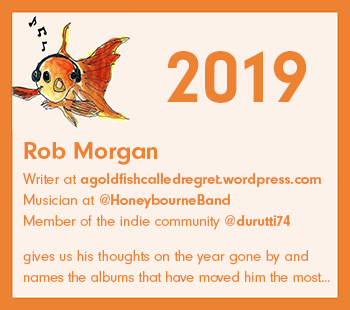
A sense of overload is inevitable these days unless you happen to live under a rock. There's just too much happening, and it all seems to be happening simultaneously. Turn on the news and whichever side of a political divide you reside on you can't deny the feeling that life could be better, and you can only blame the other side. It takes some guts to step back and look at the failings on both sides which have led to this current predicament. But that's not why we're here, even though the clouds of Brexit, climate disasters and encroaching drift of the far-Right are never far from view.
So why are we here? To celebrate the year gone by. To reflect and look forward simultaneously, like the Roman God Janus. (Yeah it's not just Boris Johnson who has a Classical education, my Latin O level has always been part of my armoury). It's been a significant year for me personally as I celebrated my 50th birthday, a half century of ups and downs and plateaux. So what have I achieved in fifty years? That's what a lot of people would say. Being born on the same day in 1969 as Jacob Rees-Mogg gives me a constant reminder of what I could never have been and what I thank God I'm not. But really do we need to achieve anything to feel happy about ourselves? As I have aged I have become less hung up on the trophies and achievements of life. To have a happy stable life in a loving relationship, to support my family in the best way I can, to be the best person for others and for the world. To do no harm, or as little as possible. Ain't that enough? Sure I didn't fulfil the potential or the investment of a future in a certain direction, but how happy would that have made me? Would I be here now in this position if certain actions hadn't happened? Probably not. So I'm finally content in my fiftieth year. ...
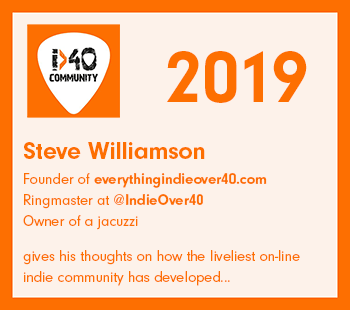
When I started Everything Indie Over 40 I initially viewed it as a way of using the opportunities social media offered to connect people who had a shared experience of an influential musical era and so in that respect it was born out of nostalgia. However, by creating a broad remit about what indie music meant to the individual rather than by genrefication I learnt very quickly that, simply put, old people were listening to new music, were very passionate about it and wanted to share it. Not only that, they were still going to gigs and just as likely to be seeing 18 year-olds on stage at The Sebright Arms as they were watching 48 year-olds at a Butlins nostalgia festival.
So rather than becoming a simply a platform for 'remembering' we developed into a place for 'discovery'.
Although this durable bond between the past and the present remained strong, the musical landscape binding it has changed inextricably. Those 18 year-olds on stage at the Sebright know nothing of record deals, albums advances, studio time and royalties. Streaming is part and parcel of their world view and how they harness its potential will form an integral part of their plans. Poor remuneration by Spotify may be a cold reality but because they were born into this landscape new artists are likely to view streaming from a different perspective to those on the stage at Butlins who lived in a different era and are more likely to decry exploitation and not without justification.


Ice Baths -
Decadent Sprinter
Blank Editions
Released: 31st May 2019

50. Bad Breeding – Exiled
49. Blanck Mass – Animated Violence Mild
48. Amyl & The Sniffers - Amyl & The Sniffers
47. Metronomy - Forever
46. Crushing - Slug
45. Black Midi – Schlagenheim
44. Snapped Ankles – Stunning Luxury
43. Swans - Leaving Meaning
42. John - Out Here On The Fringes
41. Bleakness - Functionality Extinct
40. Slow Glows - Stargaze Rock n Roll
39. Battery Hens - Ascension
38. Angel Olsen - All Mirrors
37. Oh Sees - Face Stabber
36. James Clark 5 - Parlour Sounds
35. Piroshka - Brickbat
34. 10000 Russos - Kompromat
33. Ride - This Is Not A Safe Place
32. Chastity Belt - Chastity Belt
31. The 9th Wave - Infancy
30. The Gluts - Dengue Fever Hypnotic Trip
29. Bouts - Flow
28. Slow Riot - GAD
27. Nick Cave & The Bad Seeds - Ghosteen
26. Crows - Silver Tongues
25. Toy - Happy In The Hollow
24. Suggested Friends - Turtle Taxi
23. WH Lung - Incidental Music
22. Fontaines DC - Dogrel
21. Diiv - Deceiver
